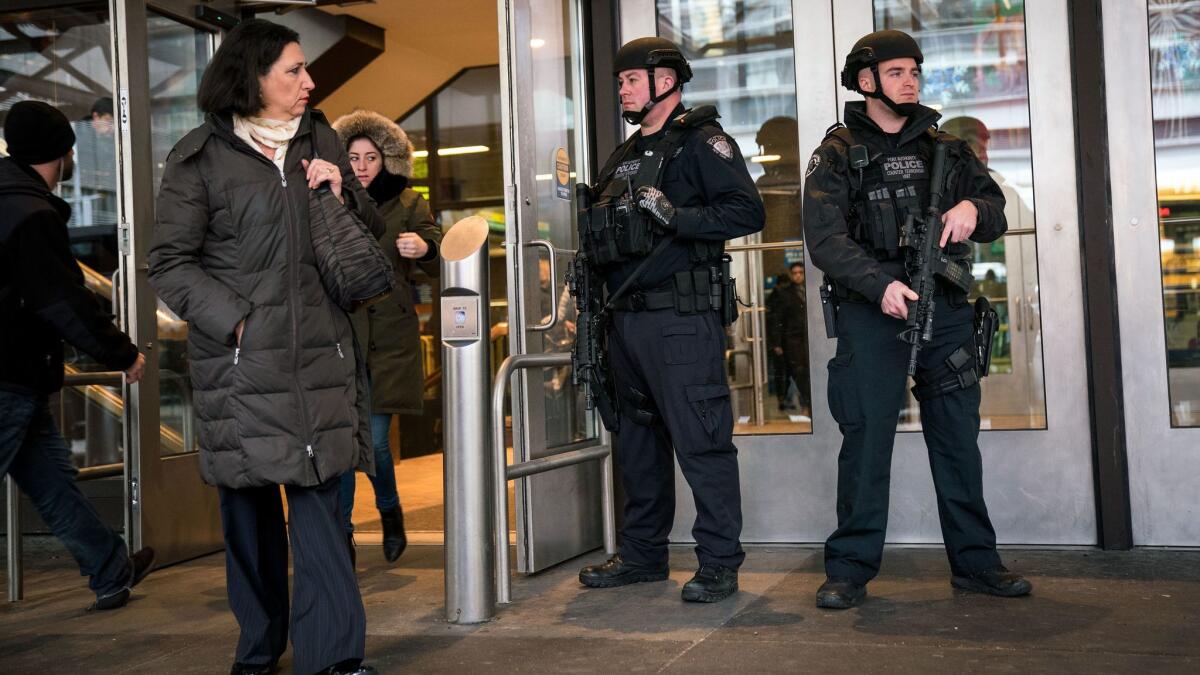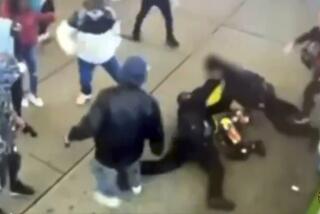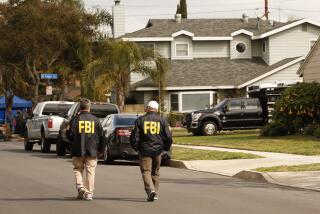Authorities say suspect in New York subway attack boasted, ‘I did it for Islamic State’

The man charged with detonating a pipe bomb in the New York transit system was radicalized through internet propaganda and, according to authorities, boasted on Facebook the day of the attack, “Trump, you failed to protect your nation.”
Akayed Ullah, a 27-year-old legal permanent resident from Bangladesh, set off the explosive in a passageway connecting two major subway stations during the morning rush hour Monday, injuring himself and four others, authorities say.
A criminal complaint filed in federal court on Tuesday quoted Ullah telling investigators, “I did it for Islamic State.” The extremist group had recently called for attacks on Western cities around the Christmas holidays. A prosecutor said Tuesday that Ullah made statements to investigators about issues he had with American policy in the Middle East, but did not provide further details.
Ullah was charged with five counts, including providing material support to a foreign terrorist organization, using and attempting to use a weapon of mass destruction, bombing a place of public use, destroying property by means of an explosive, and using a destructive device to further a crime of violence, according to a criminal complaint.
The charges were announced by Joon H. Kim, the acting U.S. attorney for the Southern District of New York.
The 10-page complaint says Ullah, who was taken to Bellevue Hospital after the explosion, admitted to building the pipe bomb and to carrying out the attack. On Monday, New York Police Commissioner James P. O’Neill said Ullah had worn what the official called an “improvised low-tech explosive device.”
The four people injured included three who experienced ringing of the ears and headaches and a fourth who fell to the ground while leaving the scene.
In a statement issued late Monday, Ullah’s family members said they were “heartbroken” by the attack but also said they were “outraged” by the behavior of law enforcement officials toward the family.
“We have seen our children, as young as 4-years-old, held out in the cold, detained as their parents were questioned. One teenage relative was pulled out of high school classes and interrogated without a lawyer, without his parents. These are not the actions that we expect from our justice system,” said the statement, issued through the New York chapter of the Council on American-Islamic Relations, a Muslim civil rights and advocacy organization.
At the news conference Tuesday, FBI Assistant Director William F. Sweeney Jr. seemed to respond to those criticisms indirectly. He said that following attacks like the one on Monday, investigators may need to “locate, detain and interview individuals to ensure the safety of the public” and of law enforcement personnel.
“Our teams use appropriate, reasonable and lawful methods to accomplish these goals,” Sweeney said.
Ullah was admitted to the United States in 2011 under the fourth family preference for immigrant visas, which is for brothers and sisters of U.S. citizens and their spouses and children.
He held a for-hire vehicle driver’s license with the New York City Taxi and Limousine Commission from 2012 to 2015 and is reported to have worked as an electrician most recently.
Ullah began becoming radicalized in 2014, through internet propaganda disseminated by Islamic State, the complaint alleges. He began researching how to build improvised explosive devices online about a year ago and started gathering materials for Monday’s attack two to three weeks ago, the complaint says.
Law enforcement officers obtained a warrant to search Ullah’s home in Brooklyn on Monday, where they found metal pipes, pieces of wires, fragments of what appear to be Christmas lights and metal screws consistent with bomb materials recovered at the scene of the attack, the complaint says.
They also found his passport with multiple handwritten notes, including one with the message, “O America, die in your rage,” according to the complaint.
Ullah remains at Bellevue Hospital. Kim said his first appearance will probably be a “bedside presentment” later Tuesday or Wednesday.
Authorities said security would be beefed up around the city. Even with the greater police presence, New Yorkers went about their business. The passageway where the attack occurred was reopened Tuesday and soon filled with commuters.
This was the second terrorist attack on the city in recent weeks. On Oct. 31, eight people were killed and at least a dozen injured as a man drove a rental truck down a busy riverfront bike path, the first deadly terrorist attack in New York City since Sept. 11, 2001.
In court documents, federal authorities say the man accused of carrying out that attack, Sayfullo Saipov, 29, an immigrant from Uzbekistan, also was inspired by Islamic State through the internet.
Earlier in October, a New Jersey man, Ahmad Khan Rahimi, 29, was convicted of planting two pressure-cooker bombs on New York City streets in September 2016. One of the bombs exploded and injured 35 people. Federal prosecutors said Rahimi had thought of himself as a “soldier in a holy war.”
Twitter: @AgrawalNina
UPDATES:
3:10 p.m.: This article was updated with comments from Akayed Ullah’s family and William F. Sweeney Jr.
11:10 a.m.: This article was updated with details from the criminal complaint filed against Akayed Ullah.
This article was originally posted at 7:25 a.m.
More to Read
Start your day right
Sign up for Essential California for news, features and recommendations from the L.A. Times and beyond in your inbox six days a week.
You may occasionally receive promotional content from the Los Angeles Times.







